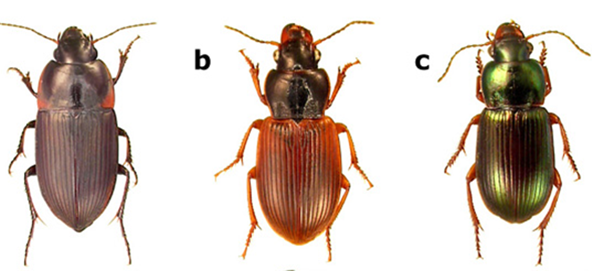BioAWARE

- Acronym: BioAWARE
- Countries involved: France, Austria, Sweden, Czech Republic and the Netherlands.
- Budget: Total budget of €1,147,602 and has been granted €858,967 through the C-IPM second call.
Tiny, shiny assistants may help farmers combat weeds
Some beetles prey on seeds from weeds. Promoting good environmental conditions for these beetles may be a way to reduce the use of herbicides.
he natural world is highly competitive. Space, light, nutrients, and water and are all up for grabs as plants, insects and other organisms compete with each other to get as much of the good things for themselves as they can. Weeds and agricultural crops are no exception, with weeds reducing crop yields. To fight back, farmers try and give their crops the edge over weeds, often by using herbicides.
The use of herbicides might be reduced with help from the insect world. A group of scientists aims to find out if this is so in a new European project involving researchers from five different research institutions in France, Austria, Sweden, Czech Republic and the Netherlands. They will explore whether a high biodiversity of insect weed seed predators can provide reliable natural weed control.
The three-year research project, entitled BioAWARE, has a total budget of €1,147,602 and has been granted €858,967 through the C-IPM second call.
- Our hypothesis is that enhancing the diversity of insect weed seed predators, using in-field and landscape management, will result in a higher and more reliable weed seed predation, and reduce the need for herbicide use, says the coordinator of the new project, Dr David Bohan from Institut Nationale de la Recherche Agronomique (INRA) in France.
Beetles may help keep weeds at bay
On the ground level, the clean-up crew of shiny beetles, belonging to the Carabidae family, actively searches for weed seeds, eating those they find and ultimately reducing weed numbers. This creates more favourable and less competitive conditions for crop plants to grow.
The question is whether farmers can promote this helpful carabid army so that their clean-up operation can reduce the need for herbicides. Finding the answer to this question will be the first step of the research project.
- We will identify and promote management options that can support a high diversity of weed seed predators for reliable weed control. We will consider all weed seed predator groups, where information is available, but will only do new experiments on insects, in particular carabid beetles, says Dr Michael Traugott of the University of Innsbruck.
The researchers will then investigate how management of the field and the surrounding landscape can support the beneficial weed seed predators and examine if weed seed predation can be used as a tool in the integrated pest management (IPM) toolbox to replace or reduce the use of herbicides.
Farmer awareness and approval of ecological manipulations in crop management is crucial to the implementation of IPM, so the researchers will also investigate how farmers take on the idea of using weed seed predators as an IPM tool and how can they be encouraged to do so.
- We will evaluate farmer attitudes to natural weed regulation from ecological, social and economic viewpoints. We will also work with farmers, advisors and researchers directly to develop, demonstrate and evaluate practical solutions that can contribute to the spread of IPM in Europe, says Dr Maia David of INRA/AgroParisTech.
For more information, please contact:
Dr David Bohan
Institut Nationale de la Recherche Agronomique (INRA), France
Email: David.Bohan@inra.fr.